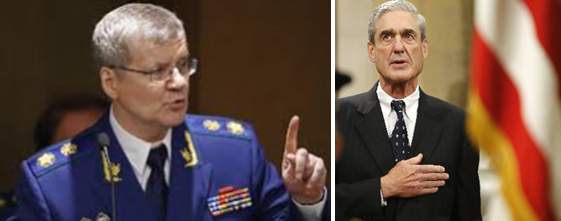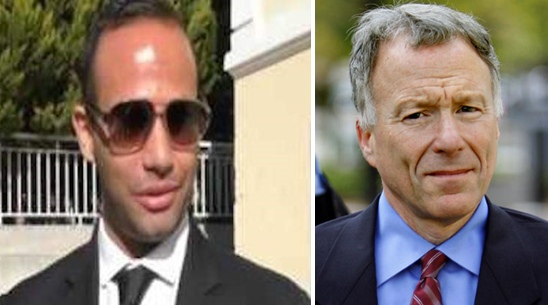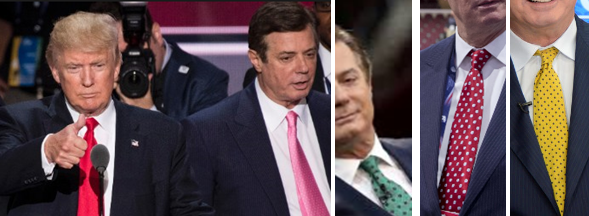By John Helmer, Moscow
Russia’s criminal prosecution authorities have expressed their appreciation for the indictments published in Washington on Monday of the alleged US criminals Paul Manafort and Richard Gates, and the admitted criminal, George Papadopoulos.
The Russians have also requested cooperation with the Federal Bureau of Investigation (FBI) and special prosecutor Robert Mueller III to identify three Russian criminals who are suspected, according to the US court papers, of the crimes of pretending to be a niece of President Vladimir Putin; of inventing their acquaintance with the Russian ambassador to the UK, Alexander Yakovenko; and of fabricating a Foreign Ministry invitation to Donald Trump to make an official visit to Russia during run-up to the presidential election of 2016.
Sources familiar with the thinking of Yury Chaika, Russia’s Prosecutor-General, acknowledge that under Russian law, pretending without obtaining money or other material gain, is more difficult to prosecute in a Russian court than in a US court. “Hustling, as you call it in America,” said one of the sources, “is an immoral practice. In Russian it’s called lying, but we don’t have enough jails for Russians who do it, nor clinics for those who allow themselves to be deceived. But America is a rich country with more jails. If Mr Papadopoulos is to be imprisoned for inventing stories, we aren’t sure if his Russian accomplices will suffer the same fate under our constitution and criminal code. We request the names from the FBI which collected them, so that our police can follow up.”
Chaika has been writing frequently these days to Washington. Last week he confirmed on national television: “I have just sent two letters to my counterpart, the new US attorney general. The first letter contains a request to launch a criminal case against the Ziff brothers and Mr. Browder, while the second concerns the Magnitsky Act.” Chaika was referring to Russian government evidence of fraud and tax evasion by William Browder, a fugitive currently living in the UK, who has also renounced his US citizenship. Chaika was also referring to US Government evidence that Ziff family entities have been engaged in foreign bribery, money laundering, tax evasion, and investments in Browder financial operations.

Left: Prosecutor-General Yury Chaika. Right: Special Prosecutor, Robert Mueller III.
In the newest US Government evidence to be released on Monday in Washington, George Papadopoulos, a former research assistant at the anti-Russian Hudson Institute of Washington, DC, has pleaded guilty to lying to the FBI. The 30-year old, who was born in Illinois and educated in London, was briefly employed in 2016 by the Trump presidential campaign as a foreign policy advisor. He has also worked for Israeli organizations.

Left: George Papadopoulos. Right: Lewis ‘Scooter’ Libby, Vice President of the Hudson Institute in charge of national security and defense issues; he employed Papadopoulos between 2011 and 2015 as an unpaid intern and research assistant. The Institute says Papadopoulos has lied about his association with Hudson. Libby is a convicted liar and felon who benefitted from a pardon for his crimes issued by President George W. Bush. For details, read this. About Libby, former UK Foreign Secretary Jack Straw said: “It's a toss-up whether [he] is working for the Israelis or the Americans on any given day.”
In documents released by the US Department of Justice, Papadopoulos has pleaded guilty to several charges of lying. According to the plea bargain he signed with Prosecutor Mueller, he has been providing evidence against others in return for a reduced sentence. Read the plea bargain in full here.
Formally, the charges carry a maximum sentence of five years in prison; three years of parole; and a fine of $250,000. Mueller’s offer, dated October 5, 2017, was to reduce the prison term to a “range [of] zero months to six months”, and a fine of $500 to $9,500.
If Papadopoulos fails to continue cooperating, Mueller has threatened to ask the court for tougher sanctions. They agreed also that the exchange of testimony for reduced penalties “is not binding on the Probation Office or the Court. Should the Court determine that a different guidelines range is applicable, your client will not be permitted to withdraw your client’s guilty plea on that basis, and the Government and your client will still be bound by this Agreement.”
The details of the lies Papadopoulos told the FBI are spelled out in the official plea, filed on October 5, in the US District Court in Washington; it was sealed until October 30. The lies were all told in an interview with FBI agents on January 27, 2017. They related to communications Papadopoulos had had with Russians over 12 weeks between March and June of 2016. After Papadopoulos’s January 27 meeting with the FBI, he was called in again on February 16; no record of what was said at that time has been disclosed. The next day, according to the FBI, Papadopoulos tried covering his tracks, cancelling a Facebook account and a mobile telephone number. This was presented in court as evidence of guilt. “I am, in fact, guilty of the crime charged,” Papadopoulos signed, though the “fact” he acknowledged was fiction. “No threats have been made to me nor am I under the influence of anything that could impede my ability to understand this Statement of the Offense fully.”
The FBI’s evidence is detailed in this 14-page dossier. Click to read. The FBI agents interrogating Papadopoulos were interested, they said, not only in his contacts with Russians, but also “[a]nyone with a Russian accent”.
The Russians identified by Papadopoulos, he told the FBI, were tricksters. One, a professor, was “just a guy talk[ing] up connections or something”. According to Papadopoulos, he believed the individual was “BS’ing to be completely honest with you.”. The FBI investigation, and Mueller’s conclusion, are that these statements are criminal lies.
Official Russian interest by Chaika and the security services is now focusing on the three Russian individuals whom Papadopoulos identified, but whose names are being kept secret by the US government. The first was a Russian professor “based in London…[who] claimed to have substantial connections with Russian government officials”. US reporters investigating this individual have pinpointed him as a Maltese, with a job at a university in Scotland, and a record of one visit to Russia and one to the Russian Embassy in London. To an American ear, the professor’s Maltese accent may sound Russian.
The second was “a certain female Russian national” whom Papadopoulos told his Trump campaign supervisors was “Putin’s niece”. The third, according to the court papers, was “an individual in Moscow (the ‘Russian MFA Connection’) who told defendant PAPADOPOULOS he had connections to the Russian Ministry of Foreign Affairs (‘MF A’). The MFA is the executive entity in Russia responsible for Russian foreign relations. Over the next several weeks, defendant PAPADOPOULOS and the Russian MFA Connection had multiple conversations over Skype and email about setting ‘the groundwork’ for a ‘potential’ meeting between the Campaign and Russian government officials.”
In fact, according to the newly released US evidence, Papadopoulos was lying to the Trump campaign about the connections, influence, and significance of the three Russian contacts. It turns out, according to the FBI, that noone was related to Putin; the Russian contacts were unable to arrange an official invitation for either Papadopoulos or Trump to visit Russia, or even the Russian Embassy in London.
Papadopoulos has pleaded guilty to lying to the FBI when he failed to reveal that he had lied to a senior member of the Trump campaign organization in an email of April 26, 2016, in which he claimed: “The Russian government has an open invitation by Putin for Mr. Trump to meet him when he is ready… The advantage of being in London is that these governments tend to speak a bit more openly in ‘neutral’ cities.”
Papadopoulos has also pleaded guilty to lying to the FBI by concealing that he had been told by his contact on April 26 that the professor had returned from a trip to Moscow where “ he had met with high level Russian government officials.” Papadopoulos didn’t ask for the names, and didn’t report checking them before telling Trump headquarters. That’s because Papadopoulos wanted to be believed by Trump more than he cared if the professor was telling him the truth.
According to the FBI, “the Professor told defendant PAPADOPOULOS that on that trip he (the Professor) learned that the Russians had obtained ‘dirt’ on then-candidate Clinton. The Professor told defendant PAPADOPOULOS, as defendant PAPADOPOULOS later described to the FBI, that ‘they [the Russians] have dirt on her’; ‘the Russians had emails of [Hillary] Clinton’; ‘they have thousands of emails.’”
It didn’t occur to Papapopoulos, the Trump campaign chiefs, the FBI, Prosecutor Mueller or the Justice Department to check whether the “dirt on Clinton”, the “emails of Clinton”, and the “thousands of emails”, were openly accessible after their publication commenced by Wikileaks on March 16, 2016; that was five weeks before the “Professor” went to Moscow to discover what had already appeared in London and Washington on the internet. Read the Wikileaks archive, starting here. The Wikileaks publications included some 30,000 emails and more than 50,000 document pages covering the period from June 2010 to August 2014.
But Wikileaks wasn’t the first to disclose the dirt and the Clinton emails. The US Department of State had begun the disclosure in May of 2015, when a media-led Freedom of Information Act request led to the opening of Clinton’s Secretary of State files, and when newspapers across the country began publishing them. Read more of the dirt Russian officials announced they had on Clinton from years earlier by clicking here.
Russian sources close to Chaika say they cannot prosecute the “Professor” for revealing what the State Department and Wikileaks had already started to publish. Nor, the sources add, is it a crime under Russian law for a Russian living in London to speak to an American.
For admitting he concealed this from his superiors in the Trump organization, and then from the FBI, Papadopoulos is now facing at least six months in jail. Russian sources say that what is now a jailing offence in the US cannot be a crime in Russia if the evidence substantiates that lies were passed about lies. According to Mueller’s prosecution of Papadopoulos, “in truth and in fact, however, defendant PAPADOPOULOS understood the Professor to have substantial connections to high-level Russian government officials and that the Professor spoke with some of those officials in Moscow before telling defendant PAPADOPOULOS about the ‘dirt.’ ”. Russian sources say there is no evidence the “Professor” has the connections he claimed. They add the US court papers prove this by revealing that none of the meetings Papadopoulos requested of his Russian contacts materialized.
Russian sources say the release of the US prosecutor’s indictment of Paul Manafort and Richard Gates III is of next to no interest to Russian prosecutors. This, they say, is because there is no evidence and no charge that any Russian person, source of Russian money, Russian publication or Russian government entity was involved in the activities for which Manafort and Gates have been indicted.
The charges against the pair of business partners are summarized in paragraph one: “Between at least 2006 and 2015, MANAFORT and GATES acted as unregistered agents of the Government of Ukraine, the Party of Regions ( a Ukrainian political party whose leader Victor Yanukovych was President from 201 O to 2014), Yanukovych, and the Opposition Bloc (a successor to the Party of Regions that fo1med in 2014 when Yanukovych fled to Russia). MANAFORT and GATES generated tens of millions of dollars in income as a result of their Ukraine work. In order to hide Ukraine payments from United States authorities, from approximately 2006 through at least 2016, MANAFORT and GATES laundered the money through scores of United States and foreign corporations, partnerships, and bank accounts.” Read the Justice Department’s indictment in full here.
The FBI has uncovered and alleged that with Ukrainian-sourced cashflow estimated to total $75 million, Manafort spent $18 million “on luxury goods and services for himself and his extended family through payments wired from offshore nominee accounts to United States vendors. MANAFORT also used these offshore accounts to purchase multi-million dollar properties· in the United States. MANAFORT then borrowed millions of dollars in loans using these properties as collateral, thereby obtaining cash in the United States without reporting and paying taxes on the income. In order to increase the amount of money he could access in the United States, MANAFORT defrauded the institutions that loaned money on these properties so that they would lend him more money at more favorable rates than he would otherwise be able to obtain.”
Manafort allegedly laundered his Ukrainian money through 17 front companies registered in the US; 12 front companies registered in Cyprus; two in the Caribbean state known as St. Vincent and the Grenadines; and one in the UK. His spending, according to the FBI, included $1,034,350 for floor rugs for his rooms, and $1,369,655 million on clothing for himself.

Paul Manafort’s costly tastes – left, President Donald Trump; right, dotted silk tie selection.
Search through the 31-page US court file for the term Russia, and just three references appear. One is the FBI’s discovery that Manafort’s company had “staff in the United States, Ukraine, and Russia”; a second, that one of Manafort’s Ukrainian clients, “the Party of Regions was a pro-Russia political party in Ukraine”; and the third, that another Manafort client, Ukrainian President Victor Yanukovich “fled to Russia” in 2014.
For the story of Russian oligarch Oleg Deripaska’s business payments to Manafort of $18,938,400, read this. Not a word has appeared in the US court papers so far about the Deripaska business.

















Leave a Reply